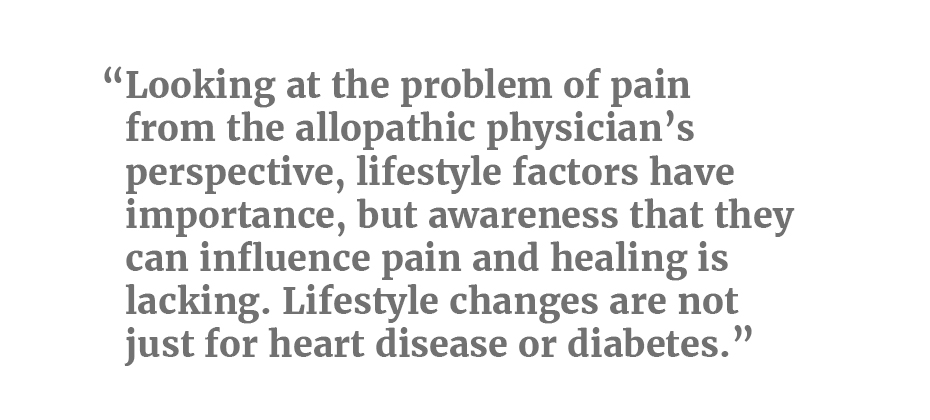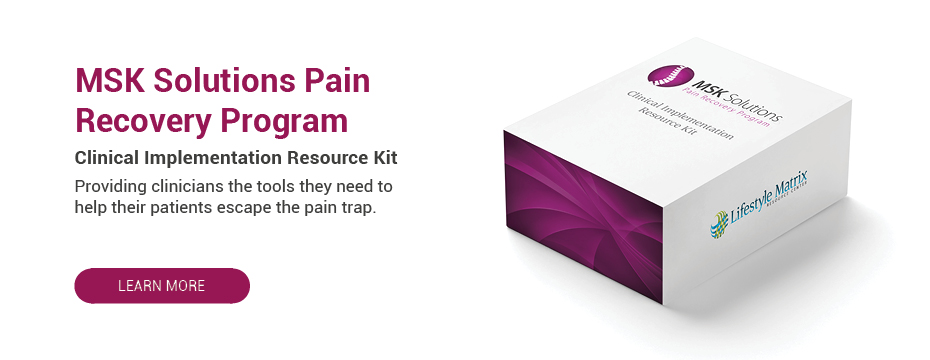
From the pages of medical journals to the worried minds of family members watching loved ones suffer, the opioid crisis continues to permeate our society. Whether in chiropractic, allopathic or physical therapy offices, clinicians must focus on bringing awareness and solutions to patients concerned about physical pain and the very-real risk of addiction.
It’s estimated as many as 60,000 deaths per year occur due to this addiction crisis, plus untold damage to families and communities, especially in rural areas. The crisis weighs on our economy and we’re beginning to see its effects within the functional medicine community. Our patients are looking for alternative solutions, and the problem of pain is at the top of their lists.
From a chiropractic perspective, it is critical to look at the biomechanics, identify the chronic pain point, and relieve that pain first. This is a two-point problem: There may be an opioid addiction or even an NSAID addiction to address, and the original trigger problem must be identified. Starting with the trigger problem allows you to provide the patient pain relief and give them hope of recovery, so you can effectively address their addiction. This approach to treatment is so important to consider—it has implications on both the psychological and physical aspects of healing and recovery.
We recommend talking with patients about the importance of lifestyle, including sleep hygiene, water intake and movement, and how these factors can change inflammation levels in their bodies and improve response to the therapeutics you’re providing. The lightbulb will go off for them; this will intuitively make sense. And as they start making small changes and seeing results, they’ll have the confidence and motivation to keep going!
Looking at the problem of pain from the allopathic physician’s perspective, lifestyle factors have importance, but awareness that they can influence pain and healing is lacking. Lifestyle changes are not just for heart disease or diabetes. It's also important to recognize that while most of health care focuses on regulating opioid medications and reducing addiction rates, it does not place equal or greater emphasis on identifying and resolving the root cause of the pain trigger(s). This realization is key for patients and clinicians. Patients don’t just want to avoid opioid medications, they want you to help them solve their pain problem!

Providing our patients the right information, tools and expectations will set them up for success. Our job as clinicians is to give patients hope and continue providing them the fuel to keep going. When we look at the big picture of health and help patients achieve the results they are looking for, we build their trust and become their health advocate for life.

About Adrian den Boer DC, ND
Educated in both the Netherlands and the United States, Dr. Adrian den Boer is a board-certified and licensed Naturopathic and Chiropractic physician. In addition, Dr. den Boer is fully certified as a functional medicine doctor. Dr. den Boer has treated over 10,000 patients successfully by utilizing multiple resources to manage patient care. Most recently, he joined the Lifestyle Matrix Resource Center as the Clinical Expert serving the MSK Solutions Pain Recovery Program.

Shilpa P. Saxena, MD
Shilpa P. Saxena, MD is a Board-Certified Family Practice physician whose passion and purpose come to life through sharing her innovative patient education and practice management solutions in her classic ‘keep it simple’ style. She serves as Faculty with the Institute for Functional Medicine, the Arizona Center for Integrative Medicine, the University of Miami, Miller School of Medicine, the Metabolic Medical Institute at George Washington University and most recently, joined the Lifestyle Matrix Resource Center serving as the Clinical Expert for the CM Vitals Program. Dr. Saxena is an expert in the Group Visit medical model, creator of Group Visit Toolkits, and co-author of The Ingredients Matter: India.



